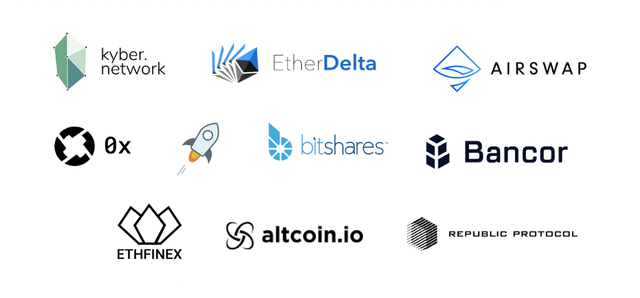Cryptocurrencies and blockchain-based technologies are blooming. Transaction volume has reached $20B per day, market capitalizations are through the roof, and user adoption has reached a truly global scale. Blockchain’s increasing utility in diverse use cases is moving the world closer to a trustless economy, thus removing the need for third parties to exchange goods and services.
Paradoxically, more than 99% of all cryptocurrency transactions pass through absolutely centralized exchanges on platforms such as Coinbase, GDAX, Binance, and Bittrex. That’s right, decentralized assets are being stored and traded on centralized platforms which operate as escrows for their clients and do not record transactions on the blockchain. This has led to massive breaches of security and the unsafe handling of funds, private keys, and personal data. In 2018 alone, more than ~$730M in cryptocurrency has been stolen by hackers.
Trading cryptocurrencies is a risky business, but there is no reason that traders should face risks other than those they are already willing to take. The blockchain community understands this problem, and several entrepreneurs are taking it upon themselves to create what they believe will be the future of trading: Decentralized Exchanges. The central idea here is that traders should remain custodians of their funds.
Before diving in, some definitions:
Centralized Exchanges (CEX): A centralized exchange is a third party platform that matches two entities, such as individuals and institutions, looking to transact or exchange with each other. Centralized exchanges enforce KYC and AML verifications and facilitate fiat on/off-ramps. These platforms also store much of their customers’ personal information, account balances, portfolio allocations, and fund positions.
Decentralized Exchanges (DEX): A decentralized exchange is not coordinated by any one central entity. Instead, it runs on a distributed ledger, like cryptocurrencies themselves. By definition, decentralized exchanges do not facilitate fiat on/off-ramps. Additionally, unlike central exchanges, these platforms do not hold their customers’ personal information, account balances, portfolio allocations, and fund positions.
The benefits of decentralized exchanges are significant
1. No single point of failure: Centralized exchanges generate significant trade volume through the millions of customer funds and accounts that utilize the platform. These exchanges serve as legal custodians responsible for the billions of trades per day, all of which are maintained on traditional servers. By allowing customers to log in with an email and password, centralized exchanges become a hugely attractive target for hackers and bad actors. Decentralized exchanges, on the other hand, run on a distributed ledger and therefore do not face the same risks of exploitation. If certain nodes are breached, the network would still operate normally and security would not be compromised. Also, because they do not hold the funds and the private keys of their entrusted users, decentralized exchanges keep their users’ funds and personal data secure without undermining their privacy rights.
2. No single point of control: One of the main reasons why cryptocurrencies appeal to such a massive, global audience is because they can operate outside the reach of any one government, regulator or central authority. While this clearly raises questions on best practices to monitor criminal activity of funds, it also means that individuals can escape corrupt government regimes that have the ability to improperly seize privately owned assets. In a truly decentralized exchange, there is no way for any one person or entity to “take control” of the system, making it much more resistant to censorship, government interference, and power games.

So why isn’t everyone using decentralized exchanges?
While decentralized exchanges offer tremendous benefits in their anonymity, security, and freedom from censorship, there are multiple practical challenges that must be overcome become they can compete with the existing centralized exchanges:
1. Usability: The relatively poor (in comparison to Coinbase) user interface and user experience of DEX platforms drastically restricts their reach.
2. Functionality: Decentralized exchanges are still well behind centralized exchanges in terms of functionality, including shortcomings in order type (no stop loss or limit order available). Their low trade volumes also limit the diversity of coins made available and contribute to a lack of quality coins to trade.
3. Speed: Validating each transaction on the blockchain takes time.
4. Interoperability: There is a need for cross-chain exchanges and more decentralized platforms to interact with one another.
5. Liquidity: Traders do not join decentralized exchanges because few other traders are on the marketplace to be the counterparty for their trade, which leads to a low transaction volume and the classic chicken and egg problem.
ConclusionExperts argue whether the switch to decentralized exchanges will take place soon. However, one catalyst that might spur the adoption and advancement of decentralized exchanges according to some VCs is the shut down or failure of a top 20 centralized exchange. There is no doubt that the challenges facing decentralized exchanges are solvable, and we are confident that they will be an essential pillar of the blockchain ecosystem.
Hi! I am a robot. I just upvoted you! I found similar content that readers might be interested in:
https://www.blockchainbeach.com/why-decentralized-exchanges-dex-are-the-future/
Downvoting a post can decrease pending rewards and make it less visible. Common reasons:
Submit
Congratulations @totlecrypto! You received a personal award!
You can view your badges on your Steem Board and compare to others on the Steem Ranking
Do not miss the last post from @steemitboard:
Vote for @Steemitboard as a witness to get one more award and increased upvotes!
Downvoting a post can decrease pending rewards and make it less visible. Common reasons:
Submit
Downvoting a post can decrease pending rewards and make it less visible. Common reasons:
Submit